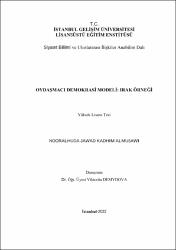| dc.contributor.author | Al Musawi, Nooralhuda Jawad Kadhim | |
| dc.date.accessioned | 2023-01-26T07:17:52Z | |
| dc.date.available | 2023-01-26T07:17:52Z | |
| dc.date.issued | 2022 | en_US |
| dc.identifier.uri | https://hdl.handle.net/11363/3777 | |
| dc.description | Danışman: DR. ÖĞR. ÜYESİ VIKTORIIA DEMYDOVA
Yer Bilgisi: İstanbul Gelişim Üniversitesi / Lisansüstü Eğitim Enstitüsü / Siyaset Bilimi ve Uluslararası İlişkiler Ana Bilim Dalı
Konu: Siyasal Bilimler = Political Science | en_US |
| dc.description.abstract | Irak'ın, 2003 yılında ABD tarafından işgal edilmesi sonrasında ülkede demokratik bir sistem kurulabilmesi için bölünmüş toplumlara sahip ülkelerde uygulanan en başarılı demokratik siyasal sistemlerden biri olarak kabul edilen oydaşmacı demokrasi modeli uygulanmıştır. Fakat bu model, Irak'ta yoğun eleştirilere maruz kalmıştır. Tezin amacı, 2003 sonrası Irak'ın siyasi sisteminin, oydaşmacı demokrasi modeli ile ne kadar uyumlu olduğunu araştırmak; bunun yanı sıra, bu modelin karşılaştığı sorunları ve yarattığı etkileri ortaya koymaktır. Çalışmada oydaşmacı model, kurucusu Arend Lijphart ve bu modeli geliştiren yeni nesil yazarlar John McGarry ve Brenden O'Leary'nin görüşleri çerçevesinde anlatılmaya çalışılmıştır. Bu kapsamda ilk olarak oydaşmacı demokrasi modeli kavramı, gelişimi ve nitelikleri anlatılmıştır. Ardından, Irak'ın jeopolitik ve jeostratejik öneminden bahsedilmiş; Irak Devleti'nin kurulduğu 1921 yılından 2003 yılına kadar yaşanan sosyal ve siyasi gelişmelere ışık tutulmuştur. Ayrıca Irak'ta demokrasi inşa etme rolünü üstlenen ABD'nin, bu işgali gerçekleştirmeye iten hedefleri de incelenmiştir. Sonrasında 2005 yılında kabul edilen Irak Anayasasının hazırlanma süreci ve ABD'nin rolüne, ayrıca Irak'ta toplumları arasındaki farklı bakış açılarına odaklanılmıştır. Lijphart'ın, bölünmüş toplumlarda anayasayı hazırlayanlara başaralı bir oydaşmacı demokrasi inşa etme konusundaki tavsiyeleri çerçevesinde Irak anayasası incelenmiştir. Tezinin son bölümünde, Irak'ta oydaşmacı demokrasisinin başarısızlığı, karşı karşıya olduğu sorunlar ve bu sorunların yarattığı etkileri incelenmiştir. Çalışma neticesinde, Irak'ın Kalıcı Anayasası'nın, Lijphart'ın oydaşmacı demokrasinin uygulanması ve başarısı için önerdiği ilkeleri kabul etmiştir. Ancak Irak'ta bu model, birçok sorun karşı karşıya kalmıştır. Bu durum, Anayasa'da oydaşmacı demokrasi modelinin önemli ilkelerinin çoğu bulunmasına rağmen halen uygulanamamasına yol açmıştır. Dolayısıyla oydaşmacı demokrasi mekanizmalarının bir kısmının Anayasa'da yer almasına rağmen uygulanamaması, ülkede demokrasinin kurulması ve toplumlar arasındaki bölünmelerin azaltılmasında etkili olamamıştır. | en_US |
| dc.description.abstract | The consociational democracy model, regarded as one of the most successful democratic political systems for countries with divided societies, has been implemented in Iraq for the establishment of a democratic system in the wake of the US occupation in 2003. This model, however, has been harshly criticized in Iraq. The aim of this thesis is to examine to what degree the post-2003 political system in Iraq is compatible with the consociational democracy model, and describe the problems facing the model and the impact it has created. The consociational model was described within the framework of the views of Arend Lijphart, the scholar who originally developed the model, and John McGarry and Brenden O'Leary, the next generation authors who improved it. In this context, first, the concept of consociational democracy model, its development and characteristics were explained. Then, the geopolitical and geostrategic importance of Iraq as well as the social and political developments between 1921 when the Iraqi state was established, and 2003 were described. In addition, the motives behind the US occupation of Iraq were also discussed as the US assumed the role of building democracy in Iraq. Next, the drafting process for the Iraqi constitution, adopted in 2005, and the role of the US as well as different perspectives of communities in Iraq were also emphasized. The Constitution of Iraq was examined in line with the advice Lijphart gave to constitution drafters for building a successful consociational democracy. In the last section of the thesis, the failure of consociational democracy in Iraq, the problems facing it and the effects of these problems were studied. The study found that the permanent Constitution of Iraq adopted the principles Lijphart proposed for the implementation and success of the consociational democracy model. However, this model encountered many problems in Iraq. This led to the lack of implementation of major principles of the consociational democracy model although the Constitution incorporates many of them. Therefore, the consociational democracy mechanisms were not effective in building a democracy and mitigating fragmentation among communities in the country because of failure to implement some of these mechanisms although they are embodied in the Constitution. | en_US |
| dc.language.iso | tur | en_US |
| dc.publisher | İstanbul Gelişim Üniversitesi Lisansüstü Eğitim Enstitüsü | en_US |
| dc.rights | info:eu-repo/semantics/openAccess | en_US |
| dc.rights | Attribution-NonCommercial-NoDerivs 3.0 United States | * |
| dc.rights.uri | http://creativecommons.org/licenses/by-nc-nd/3.0/us/ | * |
| dc.subject | Irak | en_US |
| dc.subject | Anayasa | en_US |
| dc.subject | Oydaşmacı Demokrasi | en_US |
| dc.subject | Bölünmüş Toplum | en_US |
| dc.subject | Parlamenter Cumhuriyet | en_US |
| dc.subject | Iraq | en_US |
| dc.subject | Constitution | en_US |
| dc.subject | Consociational Democracy | en_US |
| dc.subject | Divided Societies | en_US |
| dc.subject | Parliamentary Republic | en_US |
| dc.title | Oydaşmacı demokrasi modeli: Irak örneği | en_US |
| dc.title.alternative | The model of consociational democracy: Iraq example | en_US |
| dc.type | masterThesis | en_US |
| dc.department | Lisansüstü Eğitim Enstitüsü | en_US |
| dc.relation.publicationcategory | Tez | en_US |



















